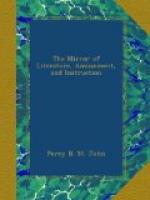Right merry now the hours they pass,
Fleeting thru jocund pleasure’s
glass,
The yule-clog too burns bright and clear,
Auspicious of a happy year:
While some with joke, and some with tale
But all with sweeter mulled ale,
Pass gaily time’s swift stream along,
With interlude of ancient song—
And as each rosy cup they drain,
Bounty replenishes again.
An happy time! hours like to these,
Tho’ fleeting, never fail to please.
Who reigns, who riots, or who sings,
Or who enjoys the smiles of kings.
What preacher follows half the town;
Who pleads, with or without a gown;
Who rules his wife, or who the state;
Who little, or who truly great;
What matters light the world amuse,
Where half the other half abuse;
Whether it shall be peace or war,
Or we remain just as we are—
Is all as one to those we see
Around the cup of jollity.
Old age, with joke will still crack on,
And story will be dwelt upon—
Till Christmas shows his ruddy nose,
They will not seek for night’s repose,
Nor this their jovial meeting close.
A FRIEND.
In utter prostration, and sacred privacy of soul, I almost think now, and have often felt heretofore, man may make a confessional of the breast of his brother man. Once I had such a friend—and to me he was a priest. He has been so long dead, that it seems to me now, that I have almost forgotten him—and that I remember only that he once lived, and that I once loved him with all my affections. One such friend alone can ever, from the very nature of things, belong to any one human being, however endowed by nature and beloved of heaven. He is felt to stand between us and our upbraiding conscience. In his life lies the strength—the power—the virtue of ours—in his death the better half of our whole being seems to expire. Such communion of spirit, perhaps, can only be in existences rising towards their meridian; as the hills of life cast longer shadows in the westering hours, we grow—I should not say more suspicious, for that may be too strong a word—but more silent, more self-wrapt, more circumspect—less sympathetic even with kindred and congenial natures, who will sometimes, in our almost sullen moods or theirs, seem as if they were kindred and congenial no more—less devoted to Spirituals, that is, to Ideas, so tender, true, beautiful, and sublime, that they seem to be inhabitants of heaven though born of earth, and to float between the two regions, angelical and divine—yet felt to be mortal, human still—the Ideas of passions, and desires, and affections, and “impulses that come to us in solitude,” to whom we breathe out our souls in silence, or in almost silent speech, in utterly mute adoration, or in broken hymns of feeling, believing that the holy enthusiasm will go with us through life to the grave, or rather knowing not, or feeling not, that the grave is any thing more for us than a mere word with a somewhat mournful sound, and that life is changeless, cloudless, unfading as the heaven of heavens, that lies to the uplifted fancy in blue immortal calm, round the throne of the eternal Jehovah.—Noctes—Blackwood’s Magazine.




